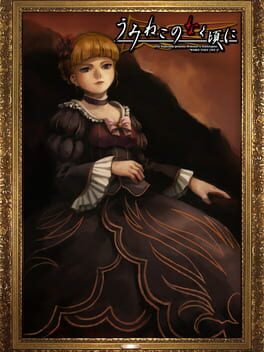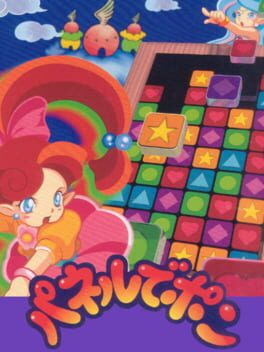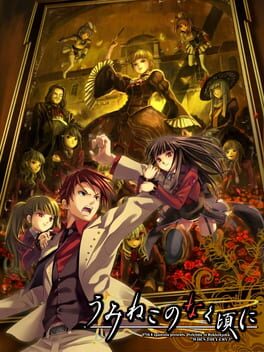zerotoker
Bio
aspiring gamer
the beatrice portrait in my #1 spot represents both higurashi and umineko. they are both tied as my favorite games
aspiring gamer
the beatrice portrait in my #1 spot represents both higurashi and umineko. they are both tied as my favorite games
Badges

Well Written
Gained 10+ likes on a single review

Popular
Gained 15+ followers

Gone Gold
Received 5+ likes on a review while featured on the front page

Liked
Gained 10+ total review likes

1 Years of Service
Being part of the Backloggd community for 1 year

N00b
Played 100+ games

Best Friends
Become mutual friends with at least 3 others

Noticed
Gained 3+ followers
Favorite Games
170
Total Games Played
000
Played in 2024
210
Games Backloggd
Recently Reviewed See More
This review contains spoilers
“You have your way. I have my way. As for the right way, the correct way, and the only way, it does not exist.” - Friedrich Nietzsche
Historians, whether they be of the armchair or academia-spoiled variety, will indefinitely debate what the most pivotal and transformative event is. Despite these disagreements, there are two indisputable historical events that have forever altered the course of history. The first and most obvious example of this is Dr. J. Robert Oppenheimer’s invention of the atomic bomb in the 1940’s. The second answer, certainly the less sexy of the two, is Johannes Gutenberg’s 16th century introduction of the printing press. Gutenberg’s legacy is expandable to any facet of history itself, but before diving into that, it’s worth recontextualizing this for modernity’s sake. Before the era of the internet, there was this idea of ‘centralized information’. Not that everybody thought the same way or lived the same way- there have been wars fought over this since Man realized that pain can be inflicted onto others. In more ways than are worth getting into here, information essentially had to be centralized, thanks to a lack of improper education systems combined with lackluster literacy rates among the average Western citizen; we were to rely on those who could teach us- the ones that could Preach The Gospel. Though it may sound obvious, it’s worth reminding ourselves there was a point in time, not too long ago, that there wasn’t a choice of where we received our information. If the medieval example of weaponization was physical pain present in warfare and the like, then the contemporary equivalent are methods of influence and persuasion that could offer similar advantages. Martin Luther’s utility of the printing press was The game-changer; information and knowledge became readily available to the masses for the first time in history, leading not only to a total shift in how we think about ideas and interpret them, but allowing for an influx of opinion that wouldn’t have been heard otherwise. One of the most infamous early examples of a printing press beneficiary is Nostradamus, a jack of all trades as the history textbooks may tell us, but most importantly, he was a clairvoyant of sorts, The Seer; Les Prophéties (1555 A.D.) was a collection of Nostradamus’s prophecies of events that were to occur throughout the course of Earth’s existence. The default reaction that most people have upon reading the prophecies is that it’s a load of nonsense. An entirely sane response to have- I’d go as far as to say that I agree. What’s worth emphasizing here, is not that Nostradamus was full of shit, but that there is an option to disagree.
The printing press also introduced humans to think more ‘freely’ than we once could. All technology brings a mutual existence of benefit and dilemma. The quest for Truth is something that the average daydreamer will inevitably come to a crossroads with. The questioning of life’s meaning and what the future may hold rings through our ears on a day-to-day basis, but it’s rare that one ever comes to an actual acceptance of an answer. The ability to think brings you the benefit of having a brain full of ideas, the dilemma may be that you’ll never truly know how you feel. This is, part of a much bigger reasoning, why some turn to religion or philosophy; there is a comfort in just being told that this is that and that is this. Questioning another person’s logic or way of thinking is a lot harder to do when we have a direct relation to said philosophy. It boils down to trust; why am I to believe the random person that gives me one answer rather than the person I consider my best friend, who gives me an entirely different answer? This is the crisis of common knowledge.
The first three episodes of the questions arc (we’ll get to the fourth and final episode, then) have their stories told via ‘game boards’ which presents a new permutation of the events that occurred on October 5th and 6th, 1986. These game boards all take place on the remote island of Rokkenjima, located off of the tokyo coast. This entire island, as we are told, is owned and inhabited by family head Kinzo Ushiromiya: an inheritor of mass wealth, maintaining an equal distribution of addiction to absinthe, chess, and magic. Each game board has a set number of murders that occur, in a whodunnit style that leaves both the characters and reader unsure of what to believe. Each game board has a different combination of characters that die, but each case regarding time and reasoning, intentionally vague at points, follows The Witch’s Epitaph.
The selection of characters, if not random, is something that I am not sure of. Knowing Ryukishi07, though, I’d like to rephrase that and say that it’s something that I am not sure of yet. I am not going to get ahead of myself and introduce each character, you should already be familiar with them, anyways, but Umineko has an overwhelming amount of them, or so it appears that way at face value. Robert Altman’s 1975 film Nashville level of characters. With a head count of eighteen, the reader is offered a menu that shows the Ushiromiya family tree as a way to refer to characters early on when you are less familiar with them or who is whose parent/child, for instance. It serves an entirely different purpose throughout the rest of the questions arc; I found myself referring to it mostly to read the character descriptions and how they change when a character dies. Before I realized that this would be the main reason I make use of it, I found myself already familiar with the characters I was introduced to. Ryukishi manages to put so much effort, meaning, and time into his characters that it somehow feels that each one gets an equivalent amount of screen time (this is absolutely not the case). The entire cast feels as if they have a direct purpose and meaning in Umineko, a Chekhov's Gun of sorts. I believe in Ryukishi and 07th Expansion enough to know this is intentional. There is no fluff, there are no “filler arcs”- the astronomical quantity of words that Ryukishi writes are not without purpose. The interactions between characters and their respective pairing has a purpose- whether it be Kanon and Shannon or Eva and Hideyoshi, the pairings that we often find have some underlying emotion and meaning behind them. Oftentimes more than not, they share love. Love is something that is an essential part of how Ryukishi07 writes, and without it I strongly believe you would wind up with a lower quality of writing. Learning this way that Ryukishi07 views love and intrapersonal relationships is crucial to When They Cry as a whole.
As the game boards repeat, the information that we get increases in quantity and quality. What’s important to mention about what is given to the reader is not only does it help you solve Rokkenjima in early October 1986, but it gives you the missing ‘why’. This is a lot more important than whatever conclusion you may come to, and a hell of a lot less accredited than deserved. Battler Ushiromiya dismisses his initial theories after the first game board with an answer being ‘too easy’. This is something we’ve all related to, taking up a task that we may deem as complex, figuring out the solution and thinking that was it?- readily available knowledge creates a paradox that allows constant doubt of our own decisions or conclusions because of that option to think of what the Answer is. It’s a blessing and a curse. Why did you stop thinking? he’ll ask himself. This creates a paradox of sorts: did Battler stop thinking about a less obvious answer that may be more accurate, even if only marginally, or did he stop thinking about why the easy answer may be The answer? Answers mean ultimately nothing if an underlying foundation of reasoning and context is absent- I believe this to be true in nearly every facet of life. A part of me enjoys the Christie-esque theory craftings that lie between the questions and answers arc. The other part of me wonders whether The Answer matters. This is not to say that one's ability to ‘solve’ Umineko or not is necessarily impressive or unimpressive, you should be able to back up your own theory if it’s something that you believe in. I think that’s what Umineko does best at its core: these lessons of whether we truly believe in something or understand the concepts and emotions that we imagine to be true are crucial to properly processing that emotion.
This leads me into a quick mention regarding the fourth and final episode: Alliance of the Golden Witch. From my understanding, this is the most disliked episode in the questions arc. I’d imagine that this is the same crowd that doesn’t like Chapter 7 of Higurashi. I absolutely adore the relationship that Ange and Maria have. The sections of this episode that are spent displaying the growth and development of Ange’s understanding of ‘magic’ and how that relates to Maria is spectacular.
Howard L. Boorman, once-was Foreign Service Officer representing the U.S. in China, wrote in a 1996 edition of The China Quarterly: The label “history” is conventionally used with at least two distinct meanings: history-as-actuality and history-as-record. It is hard not to think of history as a giant game of back-and-forth semantics between the armchair and academic historian. Marx’s Theory of Historical Materialism brought to life this understanding that the ‘fundamental truth’ of a society’s history is told by those who have higher socioeconomic position relative to their nation’s output. Simply put: the wealthier ruling class are the ones going to be telling the stories of their nation that build a foundational understanding of what occurred through the years. History is told by the winners. I tend to view Umineko through a similar lens that Karl Marx viewed history as a whole.
It’s also hard not to think of these board games in dogmatic terms when storytelling is set up to be that way. Oftentimes the reader/listener has a certain level of trust in a storyteller, but aside from this inherent, yet willing and unknowing reasoning, there is not much supporting it.The average reader will not have a direct relationship with the storyteller. Without a familiarity of the author’s prior work, or an ability to contextualize a number of factors, the easiest option is to blindly accept what we are told. Umineko manages to use its format to manipulate this in a way where you (seemingly) cannot allow all three of these stories to coexist with one another. There are a mere number of contradictions that make this nearly impossible. This is not to say that I believe one out of the three game boards is the Truth; Higurashi is not read in this way, nor should it be.
All of this raises the question: what are we to believe? If this foundation of trust and normalities are stripped away, then what does that leave? It’s a downward spiral of second-guessing and self doubt that we face in our realities every single day; Umineko is the only piece of art that I can think of where it manages to take that concept into action by making you question every single thing that you’re reading, seeing, or hearing. The three game boards being told one after the other have their purposes regarding the story’s characters and development, but it also means that you don't necessarily have the option to poke holes in theories as you normally could if it was one game board. You can do this on an individual level, but when it comes to finding an answer for the sum of its parts, you come to a dead end.
Historians, whether they be of the armchair or academia-spoiled variety, will indefinitely debate what the most pivotal and transformative event is. Despite these disagreements, there are two indisputable historical events that have forever altered the course of history. The first and most obvious example of this is Dr. J. Robert Oppenheimer’s invention of the atomic bomb in the 1940’s. The second answer, certainly the less sexy of the two, is Johannes Gutenberg’s 16th century introduction of the printing press. Gutenberg’s legacy is expandable to any facet of history itself, but before diving into that, it’s worth recontextualizing this for modernity’s sake. Before the era of the internet, there was this idea of ‘centralized information’. Not that everybody thought the same way or lived the same way- there have been wars fought over this since Man realized that pain can be inflicted onto others. In more ways than are worth getting into here, information essentially had to be centralized, thanks to a lack of improper education systems combined with lackluster literacy rates among the average Western citizen; we were to rely on those who could teach us- the ones that could Preach The Gospel. Though it may sound obvious, it’s worth reminding ourselves there was a point in time, not too long ago, that there wasn’t a choice of where we received our information. If the medieval example of weaponization was physical pain present in warfare and the like, then the contemporary equivalent are methods of influence and persuasion that could offer similar advantages. Martin Luther’s utility of the printing press was The game-changer; information and knowledge became readily available to the masses for the first time in history, leading not only to a total shift in how we think about ideas and interpret them, but allowing for an influx of opinion that wouldn’t have been heard otherwise. One of the most infamous early examples of a printing press beneficiary is Nostradamus, a jack of all trades as the history textbooks may tell us, but most importantly, he was a clairvoyant of sorts, The Seer; Les Prophéties (1555 A.D.) was a collection of Nostradamus’s prophecies of events that were to occur throughout the course of Earth’s existence. The default reaction that most people have upon reading the prophecies is that it’s a load of nonsense. An entirely sane response to have- I’d go as far as to say that I agree. What’s worth emphasizing here, is not that Nostradamus was full of shit, but that there is an option to disagree.
The printing press also introduced humans to think more ‘freely’ than we once could. All technology brings a mutual existence of benefit and dilemma. The quest for Truth is something that the average daydreamer will inevitably come to a crossroads with. The questioning of life’s meaning and what the future may hold rings through our ears on a day-to-day basis, but it’s rare that one ever comes to an actual acceptance of an answer. The ability to think brings you the benefit of having a brain full of ideas, the dilemma may be that you’ll never truly know how you feel. This is, part of a much bigger reasoning, why some turn to religion or philosophy; there is a comfort in just being told that this is that and that is this. Questioning another person’s logic or way of thinking is a lot harder to do when we have a direct relation to said philosophy. It boils down to trust; why am I to believe the random person that gives me one answer rather than the person I consider my best friend, who gives me an entirely different answer? This is the crisis of common knowledge.
The first three episodes of the questions arc (we’ll get to the fourth and final episode, then) have their stories told via ‘game boards’ which presents a new permutation of the events that occurred on October 5th and 6th, 1986. These game boards all take place on the remote island of Rokkenjima, located off of the tokyo coast. This entire island, as we are told, is owned and inhabited by family head Kinzo Ushiromiya: an inheritor of mass wealth, maintaining an equal distribution of addiction to absinthe, chess, and magic. Each game board has a set number of murders that occur, in a whodunnit style that leaves both the characters and reader unsure of what to believe. Each game board has a different combination of characters that die, but each case regarding time and reasoning, intentionally vague at points, follows The Witch’s Epitaph.
The selection of characters, if not random, is something that I am not sure of. Knowing Ryukishi07, though, I’d like to rephrase that and say that it’s something that I am not sure of yet. I am not going to get ahead of myself and introduce each character, you should already be familiar with them, anyways, but Umineko has an overwhelming amount of them, or so it appears that way at face value. Robert Altman’s 1975 film Nashville level of characters. With a head count of eighteen, the reader is offered a menu that shows the Ushiromiya family tree as a way to refer to characters early on when you are less familiar with them or who is whose parent/child, for instance. It serves an entirely different purpose throughout the rest of the questions arc; I found myself referring to it mostly to read the character descriptions and how they change when a character dies. Before I realized that this would be the main reason I make use of it, I found myself already familiar with the characters I was introduced to. Ryukishi manages to put so much effort, meaning, and time into his characters that it somehow feels that each one gets an equivalent amount of screen time (this is absolutely not the case). The entire cast feels as if they have a direct purpose and meaning in Umineko, a Chekhov's Gun of sorts. I believe in Ryukishi and 07th Expansion enough to know this is intentional. There is no fluff, there are no “filler arcs”- the astronomical quantity of words that Ryukishi writes are not without purpose. The interactions between characters and their respective pairing has a purpose- whether it be Kanon and Shannon or Eva and Hideyoshi, the pairings that we often find have some underlying emotion and meaning behind them. Oftentimes more than not, they share love. Love is something that is an essential part of how Ryukishi07 writes, and without it I strongly believe you would wind up with a lower quality of writing. Learning this way that Ryukishi07 views love and intrapersonal relationships is crucial to When They Cry as a whole.
As the game boards repeat, the information that we get increases in quantity and quality. What’s important to mention about what is given to the reader is not only does it help you solve Rokkenjima in early October 1986, but it gives you the missing ‘why’. This is a lot more important than whatever conclusion you may come to, and a hell of a lot less accredited than deserved. Battler Ushiromiya dismisses his initial theories after the first game board with an answer being ‘too easy’. This is something we’ve all related to, taking up a task that we may deem as complex, figuring out the solution and thinking that was it?- readily available knowledge creates a paradox that allows constant doubt of our own decisions or conclusions because of that option to think of what the Answer is. It’s a blessing and a curse. Why did you stop thinking? he’ll ask himself. This creates a paradox of sorts: did Battler stop thinking about a less obvious answer that may be more accurate, even if only marginally, or did he stop thinking about why the easy answer may be The answer? Answers mean ultimately nothing if an underlying foundation of reasoning and context is absent- I believe this to be true in nearly every facet of life. A part of me enjoys the Christie-esque theory craftings that lie between the questions and answers arc. The other part of me wonders whether The Answer matters. This is not to say that one's ability to ‘solve’ Umineko or not is necessarily impressive or unimpressive, you should be able to back up your own theory if it’s something that you believe in. I think that’s what Umineko does best at its core: these lessons of whether we truly believe in something or understand the concepts and emotions that we imagine to be true are crucial to properly processing that emotion.
This leads me into a quick mention regarding the fourth and final episode: Alliance of the Golden Witch. From my understanding, this is the most disliked episode in the questions arc. I’d imagine that this is the same crowd that doesn’t like Chapter 7 of Higurashi. I absolutely adore the relationship that Ange and Maria have. The sections of this episode that are spent displaying the growth and development of Ange’s understanding of ‘magic’ and how that relates to Maria is spectacular.
Howard L. Boorman, once-was Foreign Service Officer representing the U.S. in China, wrote in a 1996 edition of The China Quarterly: The label “history” is conventionally used with at least two distinct meanings: history-as-actuality and history-as-record. It is hard not to think of history as a giant game of back-and-forth semantics between the armchair and academic historian. Marx’s Theory of Historical Materialism brought to life this understanding that the ‘fundamental truth’ of a society’s history is told by those who have higher socioeconomic position relative to their nation’s output. Simply put: the wealthier ruling class are the ones going to be telling the stories of their nation that build a foundational understanding of what occurred through the years. History is told by the winners. I tend to view Umineko through a similar lens that Karl Marx viewed history as a whole.
It’s also hard not to think of these board games in dogmatic terms when storytelling is set up to be that way. Oftentimes the reader/listener has a certain level of trust in a storyteller, but aside from this inherent, yet willing and unknowing reasoning, there is not much supporting it.The average reader will not have a direct relationship with the storyteller. Without a familiarity of the author’s prior work, or an ability to contextualize a number of factors, the easiest option is to blindly accept what we are told. Umineko manages to use its format to manipulate this in a way where you (seemingly) cannot allow all three of these stories to coexist with one another. There are a mere number of contradictions that make this nearly impossible. This is not to say that I believe one out of the three game boards is the Truth; Higurashi is not read in this way, nor should it be.
All of this raises the question: what are we to believe? If this foundation of trust and normalities are stripped away, then what does that leave? It’s a downward spiral of second-guessing and self doubt that we face in our realities every single day; Umineko is the only piece of art that I can think of where it manages to take that concept into action by making you question every single thing that you’re reading, seeing, or hearing. The three game boards being told one after the other have their purposes regarding the story’s characters and development, but it also means that you don't necessarily have the option to poke holes in theories as you normally could if it was one game board. You can do this on an individual level, but when it comes to finding an answer for the sum of its parts, you come to a dead end.
Throughout the history of video games, those that have focused on western comic book superheroes have not been particularly good. I'm framing this as a (purposefully) broad and easily-expandable idea; Some have terrible stories, some have terrible gameplay, or a mix of both. The first game that I ever played that didn't follow this predictable format was Batman: Arkham Asylum. Ten year old me at the time knew nothing about video games, but I knew that this game was a lot different from how Superman: Shadow of Apokolips felt.
It's easy to blame studios like THQ, Activision, hell, even LJN (if we're going way back) for all of the seemingly low effort superhero games that were made revolving around the superheroes that we grew up idolizing. These were essentially cash-grabs for the companies at play- consumers are bound to buy a product if it has a recognizable character on it's packaging. Marvel and DC are guilty of this throughout it's nearly decade plus run of MCU films; Why sink in unnecessary amounts of effort when the launch of the product is bound to make money, regardless of it's quality?
Marvel's Spider-Man breaks this doom loop combo of bad writing and gameplay, and capitalizes on both of them. This game's story roped me in a hell of a lot more than I ever expected it to; I am already a fan of Spider-Man himself, but I've witnessed a shocking amount of people play this game who could give less of a shit about Spider-Man (or Marvel in general). This is how you get people invested into a character or story. When a company/studio shows us this potential that they could care if they wanted to, it makes it even more upsetting to see the shitty low-effort products that are inevitably released going forward. It seems that as long as Disney keeps their paws off of Marvel Game Studios, we might be able to have a period of time where superhero games are not only good, but great.
I'm stoked to play Miles Morales and Spider-Man 2 this year. I knew I was going to play them eventually, but finally playing this game made me realize what this hype around these games actually were. I get it now!
Edit: within the next few days I'm going to write more about this game's story, and talk about it in this review
It's easy to blame studios like THQ, Activision, hell, even LJN (if we're going way back) for all of the seemingly low effort superhero games that were made revolving around the superheroes that we grew up idolizing. These were essentially cash-grabs for the companies at play- consumers are bound to buy a product if it has a recognizable character on it's packaging. Marvel and DC are guilty of this throughout it's nearly decade plus run of MCU films; Why sink in unnecessary amounts of effort when the launch of the product is bound to make money, regardless of it's quality?
Marvel's Spider-Man breaks this doom loop combo of bad writing and gameplay, and capitalizes on both of them. This game's story roped me in a hell of a lot more than I ever expected it to; I am already a fan of Spider-Man himself, but I've witnessed a shocking amount of people play this game who could give less of a shit about Spider-Man (or Marvel in general). This is how you get people invested into a character or story. When a company/studio shows us this potential that they could care if they wanted to, it makes it even more upsetting to see the shitty low-effort products that are inevitably released going forward. It seems that as long as Disney keeps their paws off of Marvel Game Studios, we might be able to have a period of time where superhero games are not only good, but great.
I'm stoked to play Miles Morales and Spider-Man 2 this year. I knew I was going to play them eventually, but finally playing this game made me realize what this hype around these games actually were. I get it now!
Edit: within the next few days I'm going to write more about this game's story, and talk about it in this review
I finished this a month or two ago but just now realized I had forgotten to write something up. Mario Bros Wonder is seriously a blast and easily the best 2d Mario game since NSMBDS. There's so much soul and creativity here that at times it didn't even feel like I was playing a Mario game, and I mean that in the best way possible. Wonder was not your run of the mill 2d Mario game that had been coming out time after time again ever since NSMB: Wii, and that's the best thing to happen to this franchise since then, as far as I'm concerned. If this is the blueprint for 2d Mario to come, I cannot wait to see what comes next.







